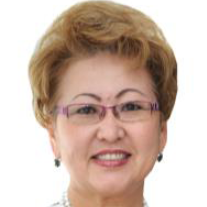
Saniya Nurgaliyeva
Work place: Department of Primary Education, Abai Kazakh National Pedagogical University, Almaty, 050010, Kazakhstan
E-mail: sanianur@mail.ru
Website: https://orcid.org/0000-0002-7653-9454
Research Interests:
Biography
Saniya Nurgaliyeva is a Candidate of Pedagogical Sciences and a Distinguished University Professor at Abai Kazakh National Pedagogical University. She is currently a visiting professor at Ataturk University in Turkey. Dr. Nurgaliyeva was the recipient of the prestigious ‗Best Teacher of Higher Education Institution – 2017‘ award from the Ministry of Education and Science of the Republic of Kazakhstan. Her research focuses on innovative processes in education, national upbringing, professional development models, and the impact of software environments in classrooms on student learning. She has published over 21 refereed articles, 3 books, and more than 100 additional publications. Dr. Nurgaliyeva has also led and participated in three research projects funded by the Ministry of Science and Higher Education.
Author Articles
The Influence of an Adaptive Non-Formal Education Model on Student Learning Activity and Engagement
By Tulebike Kulgildinova Araily Sarsembayeva Darya Surova Indira Kalelova Meruyert Zhaizhatyrova Saniya Nurgaliyeva
DOI: https://doi.org/10.5815/ijmecs.2025.05.06, Pub. Date: 8 Oct. 2025
In the context of ongoing digitalization and the growing importance of non-formal education in Kazakhstan’s higher education system, there is an increasing demand for adaptive educational models that address students' individual learning needs and broaden the scope of academic engagement. This study examines the effects of an adaptive non-formal education model on students' learning activity and engagement, and identifies the model components with the most significant impact. A quantitative quasi-experimental design was employed, involving pre- and post-intervention assessments using validated questionnaires. Key indicators included participation in supplementary educational activities, online learning platforms, external courses, and project-based or volunteer initiatives. The results indicate a statistically significant improvement in students’ educational involvement in the experimental group, as demonstrated by increased participation in external learning events, greater self-directed learning, and the development of personalized educational trajectories. The study highlights the potential of adaptive non-formal education as a strategic tool to enhance institutional flexibility and student motivation. Its novelty lies in testing a context-sensitive adaptive non-formal education model tailored to Kazakhstan’s institutional realities. The findings contribute to the global discourse on flexible education strategies and suggest directions for scaling and integrating the model into digital academic ecosystems.
[...] Read more.Other Articles
Subscribe to receive issue release notifications and newsletters from MECS Press journals